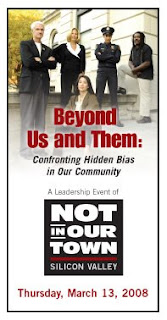On March 13, over 150 Silicon Valley leaders gathered in Palo Alto, CA to try to tackle a long-term problem that affects each one of us. They weren’t venture capitalists or CEO’s, engineers or tech gurus seeking to address the looming traffic jam on the web, or the effects of the economic temblors on high tech investment. They were citizens, school leaders, police chiefs, city managers and clergy members who came together to talk about how to deal with intolerance.
 The half-day conference, called “Beyond Us and Them: Confronting Hidden Bias in our Community,” was opened by LaDoris Cordell. Cordell is Vice Provost and Special Counselor to the President for Campus Relations at Stanford University, a former judge, and Palo Alto City Council member. She asked the crowd to be heroic — not in the way that cartoon or movie characters are, but by confronting our fears and moving forward to take on hate, bigotry, and the deep divisions that many people don’t want to talk about, much less deal with.
The half-day conference, called “Beyond Us and Them: Confronting Hidden Bias in our Community,” was opened by LaDoris Cordell. Cordell is Vice Provost and Special Counselor to the President for Campus Relations at Stanford University, a former judge, and Palo Alto City Council member. She asked the crowd to be heroic — not in the way that cartoon or movie characters are, but by confronting our fears and moving forward to take on hate, bigotry, and the deep divisions that many people don’t want to talk about, much less deal with.
A diverse panel illuminated the effects of everyday acts of hidden bias. An African-American mother shared how her son became isolated from his peers at age 9, after her neighbors said they were afraid that her son might influence their children to join gangs. A Muslim leader revealed alarming statistics about the hate crime increase towards Muslims after 9/11. She also told the crowd that many times, people don’t look at her because she wears a hijab. A leader of a day laborers center talked about workers who are routinely picked up by people who hire them for construction jobs, then refuse to pay them and threaten to call immigration. A gay participant said he gave up on forming LGBT clubs inside local corporations because many employees were afraid to reveal their sexual orientation. A Sikh leader discussed what it’s like to “appear to be Muslim” because of a turban in the light of 9/11, and the alarming number of Sikh cab drivers who have been killed in the Bay Area.
After hearing from their neighbors, the crowd got down to business and started discussing solutions. These Silicon Valley leaders are working toward an American social innovation that will have a lasting influence on the health and strength of our country. They are working to build inclusive communities.
Add new comment